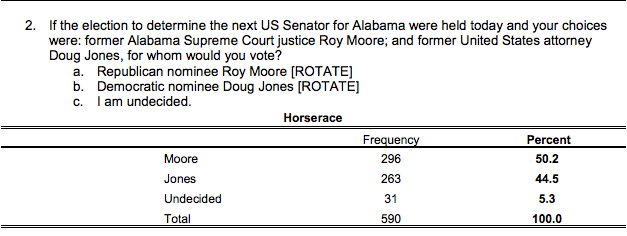
A new poll from Decision Desk HQ places Democrat Doug Jones only six points behind Republican competitor Roy Moore in Alabama’s special election to fill Jeff Sessions’ Senate seat.
Sessions left the Senate after he was appointed U.S. attorney general by Donald Trump earlier this year.
In a survey of 590 Alabaman voters, 50.2 percent indicated that they were planning to vote for Moore, a former chief justice of the state Supreme Court; 44.6 percent stated they would vote for Jones, a former U.S. attorney for the Northern District of Alabama.
The margin of error was +/- 4.0 percent.

Decision Desk HQAlabama Senate Poll, 9/27/17
Alabama is, by and large, a red state. Republicans hold majorities in both chambers of the state legislature, as well as the office of governor, giving the party trifecta control of the state.
Federally, both of Alabama’s seats in the U.S. Senate are held by Republicans, as are six of its seven seats in the House.
However, that doesn’t mean that Republican will easily win November’s special election. Historically, open races for the U.S. Senate in Alabama have not been so clear cut, and though Republicans have dominated the past three decades, that has not always been the case.
Sessions won election to his seat in 1996 by a margin of just seven percent; prior to his election, Democrats had held Alabama’s class 2 seat since 1871.
Richard Shelby, who has held Alabama’s other Senate seat since 1987, was initially elected as a Democrat, ousting incumbent Republican Jeremiah Denton by less than 7,000 votes, or 0.6 percent.
Shelby served two terms as a Democrat before choosing to change parties in 1994, then won re-election in 1998 despite his partisan flip. Prior to 1981, his seat had also been held by Democrats since 1879.
Other recent general election polls have had inconsistent results. A September 8-9 poll by Emerson College put Jones only four points behind Moore; a second from September 21-23 had Moore 22 points ahead.
With over a month to go before the election, Jones trailing behind by a mere handful of points does not bode well for Moore, particularly when factoring in margin of error.
Another challenge for Moore lies in the fact that he has not enjoyed the support of the Republican establishment until recently. Several officials, including President Trump, endorsed his opponent in the Republican primary, current Senator Luther Strange, who was appointed to temporarily fill the seat by former Governor Robert Bentley.
However, Trump did tweet his support for Moore after he defeated Strange in last week’s Republican primary runoff, and even deleted his old tweets that had expressed support for Strange.
The GOP currently holds only a two-seat majority in the Senate, and dissent from centrist Republicans like John McCain and Lisa Murkowski have severely hindered the party’s ability to pass legislation this year.
Party leaders may have preferred Strange over Moore, but preventing their slim majority from shrinking is clearly a the higher priority for Republicans. For Democrats, it’s a chance to bolster their numbers and undercut Republicans’ legislative agenda in an off-year election—a rare opportunity, indeed.
The special election will be held on November 7.